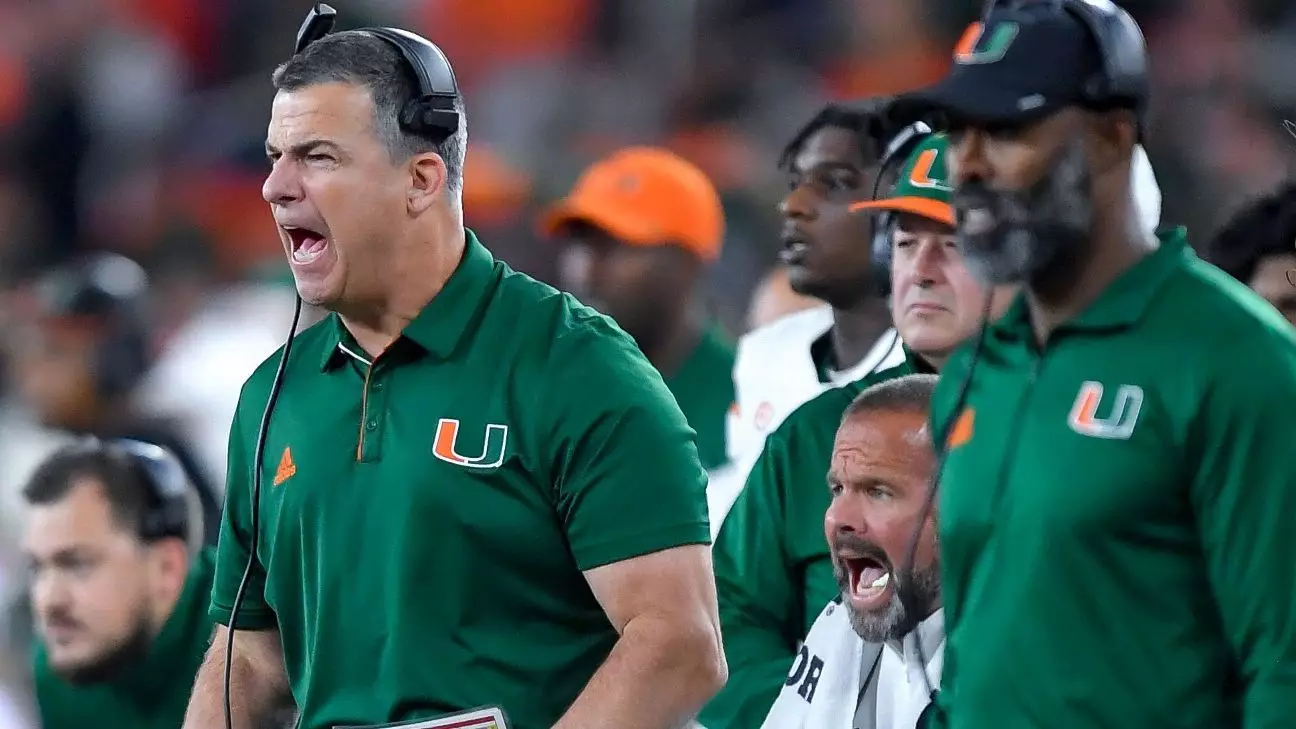The recent release of the College Football Playoff (CFP) rankings has sent ripples through the college football community, particularly for the Miami Hurricanes. On Tuesday, it was revealed that Miami sank to No. 12 in the standings, while Alabama, with a less favorable record of three losses, secured the No. 11 spot. This decision raises eyebrows and sparks significant discourse about the criteria used by the selection committee in determining playoff contenders. Miami, once riding high with a record of 10-0, finds itself outside the playoff picture, an outcome that perplexes fans and analysts alike.
Adding fuel to the fire, the Atlantic Coast Conference (ACC) commissioner, Jim Phillips, expressed deep disappointment regarding Miami’s ranking. The shock was palpable as Phillips articulated that the Hurricanes “absolutely deserve better” from the committee. His statement underscores a growing sentiment that the current playoff selection process leaves room for reevaluation. The ACC’s dissatisfaction highlights the league’s desire for recognition within the broader narrative of college football, particularly when grappling with the complexities of ranking systems that heavily influence postseason opportunities.
Miami’s road in the recent season has been tumultuous. Following a promising start, the Hurricanes faced a stark decline, culminating in another defeat against Syracuse, marking their second loss in just three games. These setbacks prevented them from reaching the ACC Championship, further complicating their playoff aspirations. Analyzing the team’s performance reveals a troubling trend; despite boasting an impressive early season record, the subsequent losses exposed vulnerabilities. Coach Mario Cristobal’s assertion prior to the rankings—pleading for the committee to “go to the facts”—presents a compelling narrative about the importance of season-long performance versus the volatility of late-game outcomes.
The crux of Miami’s plea lies in the statistical achievements that have defined their season. With a claim to lead the nation in both yards and points per game, it’s clear that Miami has demonstrated offensive prowess. The quarterback, Cam Ward, poses a legitimate Heisman Trophy candidate, having thrown 36 touchdown passes. Miami’s claim to merit is fortified by these strong indicators of capability; however, critics point out glaring weaknesses that counterbalance this argument.
Despite the Hurricanes’ offensive achievements, critics highlight significant flaws that cannot be overlooked. Miami’s record faltered primarily due to defensive weaknesses, having allowed at least 31 points in five of their last eight games. Such defensive lapses raise pertinent questions about the team’s overall competitiveness, particularly against the backdrop of a playoff context, which typically favors teams with balanced offensive and defensive strategies.
Furthermore, while Miami emphasizes its victories against teams like Florida, skeptics argue that strength of schedule plays a pivotal role in playoff selection. Miami’s losses came against unranked teams during crunch time, an indicator that the committee may view their performance as lacking when scrutinized under a national lens. These complexities expose the inherent tension between objective statistics and qualitative assessments of performance—a dynamic that continues to define discourse around college football playoff eligibility.
As the countdown to the final rankings unfolds, the debate surrounding Miami’s playoff contention raises crucial questions about the criteria employed by the selection committee. With calls for a more equitable assessment process gaining traction, it’s imperative for stakeholders to reconsider the factors influencing playoff decisions. Miami’s strong offensive record juxtaposed against its defensive shortcomings invites a reevaluation of how teams are evaluated.
In a landscape where the stakes are high, the narrative surrounding Miami warrants further exploration. The Hurricanes’ case advocates for recognition based on merits rather than reputation or historical placement, thereby challenging the current paradigms dictating playoff selections. As discussions around potential revisions to the selection process continue, Miami stands as a case study in the evolving dynamics of college football, urging a more holistic approach to evaluating success and potential in future seasons.


Leave a Reply